Willey 11th hour guide for 2019 level ii cfa exam 2019
Bạn đang xem bản rút gọn của tài liệu. Xem và tải ngay bản đầy đủ của tài liệu tại đây (31.13 MB, 361 trang )
2019
CFA* EXAM REVIEW
Wiley 11th Hour Guide for
2019 Level IICFA Exam
Thousands of candidates from more than 100 countries have relied on these Study Guides
to pass the CFA® Exam. Covering every Learning Outcome Statement (LOS) on the exam,
these review materials are an invaluable tool for anyone who wants a deep-dive review of
all the concepts, formulas, and topics required to pass.
Wiley study materials are produced by expert CFA charterholders, CFA Institute members,
and investment professionals from around the globe. For more information, contact us at
Wiley 11th Hour Guide for
2019 Level IICFA Exam
Wil e y
Copyright © 2019 by John Wiley & Sons, Inc. All rights reserved.
Published by John Wiley & Sons, Inc., Hoboken, New Jersey.
Prior to 2014, the material was published by Elan Guides.
Published simultaneously in Canada.
No part of this publication may be reproduced, stored in a retrieval system, or transmitted in any
form or by any means, electronic, mechanical, photocopying, recording, scanning, or otherwise,
except as permitted under Section 107 or 108 of the 1976 United States Copyright Act, without
either the prior written permission of the Publisher, or authorization through payment of the
appropriate per-copy fee to the Copyright Clearance Center, Inc., 222 Rosewood Drive, Danvers,
MA 01923, (978) 750-8400, fax (978) 646-8600, or on the Web at www.copyright.com. Requests
to the Publisher for permission should be addressed to the Permissions Department, John Wiley &
Sons, Inc., 111 River Street, Hoboken, NJ 07030, (201) 748-6011, fax (201) 748-6008, or online
at />Limit of Liability/Disclaimer of Warranty: While the publisher and author have used their best efforts
in preparing this book, they make no representations or warranties with respect to the accuracy
or completeness of the contents of this book and specifically disclaim any implied warranties of
merchantability or fitness for a particular purpose. No warranty may be created or extended by sales
representatives or written sales materials. The advice and strategies contained herein may not be
suitable for your situation. You should consult with a professional where appropriate. Neither the
publisher nor author shall be liable for any loss of profit or any other commercial damages, including
but not limited to special, incidental, consequential, or other damages.
For general information on our other products and services or for technical support, please contact
our Customer Care Department within the United States at (800) 762-2974, outside the United
States at (317) 572-3993 or fax (317) 572-4002.
Wiley publishes in a variety of print and electronic formats and by print-on-demand. Some
material included with standard print versions of this book may not be included in e-books or in
print-on-demand. If this book refers to media such as a CD or DVD that is not included in the
version you purchased, you may download this material at . For
more information about Wiley products, visit www.wiley.com.
Required CFA Institute® disclaimer:
“CFA® and Chartered Financial Analyst® are trademarks owned by CFA Institute. CFA Institute
(formerly the Association for Investment Management and Research) does not endorse, promote,
review or warrant the accuracy of the products or services offered by John Wiley & Sons, Inc.
Certain materials contained within this text are the copyrighted property of CFA Institute. The
following is the copyright disclosure for these materials:
“Copyright 2019, CFA Institute. Reproduced and republished with permission from CFA Institute.
All rights reserved.”
These materials may not be copied without written permission from the author. The unauthorized
duplication of these notes is a violation of global copyright laws and the CFA Institute Code of Ethics.
Your assistance in pursuing potential violators of this law is greatly appreciated.
Disclaimer: John Wiley & Sons, Inc.’s study materials should be used in conjunction with
the original readings as set forth by CFA Institute in the 2018 CFA Level II Curriculum. The
information contained in this book covers topics contained in the readings referenced by CFA
Institute and is believed to be accurate. However, their accuracy cannot be guaranteed.
ISBN 978-1-119-53158-6; 978-1-119-53163-0 (epub); 978-1-119-53164-7 (epdf)
Contents
Foreword
VII
Ethical and Professional Standards
Study Session 1: Ethical and Professional Standards (1)
Study Session 2: Ethical and Professional Standards (2)
1
7
Quantitative Methods
Study Session 3: Quantitative Methods
11
Economics
Study Session 4: Economics
51
Financial Reporting and Analysis
Study Session 5: Financial Reporting and Analysis (1)
75
Study Session 6: Financial Reporting and Analysis (2)
113
Corporate Finance
Study Session 7: Corporate Finance (1)
127
Study Session 8: Corporate Finance (2)
147
Equity Valuation
Study Session 9: Equity Valuation (1)
163
Study Session 10: Equity Valuation (2)
173
Study Session 11: Equity Valuation (3)
187
Fixed Income
Study Session 12: Fixed Income (1)
215
Study Session 13: Fixed Income (2)
225
Derivatives
Study Session 14: Derivatives
249
Alternative Investments
Study Session 15: Alternative Investments
©2019 Wiley
281
©
Portfolio Management
Study Session 16: Portfolio Management (1)
319
Study Session 17: Portfolio Management (2)
333
©2019 Wiley
Foreword
Wiley 11th Hour Guide for 2019 Level II CFA Exam is a concise and easy-to-understand
review book that is meant to supplement your review for the CFA Level II exam. It becomes
extremely difficult to go through the entire curriculum in the last few weeks leading up to
the exam, so we have condensed the material for you. You must remember, though, that this
book is not meant to be a primary study tool for the exam. It is designed to help you review
the material in an efficient and effective manner so that you can be confident on exam day.
About the Author
Wiley’s Study Guides are written by a team of highly qualified CFA charterholders
and leading CFA instructors from around the globe. Our team of CFA experts work
collaboratively to produce the best study materials for CFA candidates available today.
Wiley’s expert team of contributing authors and instructors is led by Content Director Basit
Shajani, CFA. Basit founded online education start-up Elan Guides in 2009 to help address
CFA candidates’ need for better study materials. As lead writer, lecturer, and curriculum
developer, Basit’s unique ability to break down complex topics helped the company grow
organically to be a leading global provider of CFA Exam prep materials. In January 2014,
Elan Guides was acquired by John Wiley & Sons, Inc., where Basit continues his work
as Director of CFA Content. Basit graduated magna cum laude from the Wharton School
of Business at the University of Pennsylvania with majors in finance and legal studies.
He went on to obtain his CFA charter in 2006, passing all three levels on the first attempt.
Prior to Elan Guides, Basit ran his own private wealth management business. He is a past
president of the Pakistani CFA Society.
/
/
There are many more expert CFA charterholders who contribute to the creation of Wiley
materials. We are thankful for their invaluable expertise and diligent work. To learn more
about Wiley’s team of subject matter experts, please visit: www.efficientleaming.com/cfa/
why-wiley/.
©2019 Wiley
St u d y Se s s io n 1: Et h ic a l a n d
Pr o f e s s io n a l St a n d a r d s (1)
©2019 Wiley
O
ET
ETHICAL AND PROFESSIONAL STANDARDS
CODE OF ETHICS AND STANDARDS OF PROFESSIONAL
CONDUCT; GUIDANCE FOR STANDARDS I-VII
Cross-Reference to CFA Institute Assigned Readings #1 & #2
All CFA Institute members and candidates enrolled in the CFA Program are required to
comply with the Code of Ethics and the Standards of Professional Conduct (Code and
Standards). The CFA Institute Bylaws and Rules of Procedure for Proceedings Related to
Professional Conduct (Rules of Procedure) form the basic structure for enforcing the Code and
Standards.
The Rules of Procedure are based on the following two principles:
1.
2.
Fair process.
Maintaining confidentiality of process.
The CFA Institute Board of Governors is responsible for implementing the Professional
Conduct Program (PCP) through the Disciplinary Review Committee (DRC).
The CFA Institute Designated Officer, through the Professional Conduct staff, carries out
professional conduct inquiries. Circumstances which can initiate an inquiry include:
•
•
•
•
Information disclosed on the annual Professional Conduct Statement.
Written complaints received by Professional Conduct staff.
Questionable conduct as publicized by the media or any other source.
A violation report submitted by a CFA examination proctor.
Once an inquiry is initiated, the Professional Conduct staff undertakes an investigation which
can include:
•
•
•
Requesting a written explanation.
Interviewing related person(s).
Collecting any supporting documents.
The information collected is reviewed by the Designated Officer, who may conclude that:
1.
2.
3.
No disciplinary action is needed
A cautionary letter needs to be issued
Proceedings need to be continued.
If it is concluded that there has been a violation of the Code and Standards, the Designated
Officer can propose a disciplinary sanction. The member or candidate has the right to accept
or reject the decision. A rejection would require the matter to be referred to a hearing by a
panel of CFA Institute members. Sanctions by CFA Institute may include condemnation by
peers, consequences for current or future employment or suspension from the CFA program.
The adherence of investment professionals to ethical practices benefits all market participants.
•
•
Clients are reassured that investment professionals they hire prioritize their interests.
Investment professionals benefit from the more efficient and transparent operation of
the market that integrity promotes.
©2019 Wiley
©
ETHICAL AND PROFESSIONAL STANDARDS
Sound ethics is fundamental to capital markets and the investment profession as it increases
investors’ confidence in global financial markets. Ethics is also of paramount importance
because of the interconnectedness of global financial markets, which gives rise to the issue of
market sustainability. It is imperative that top management foster a strong culture of ethics not
just among CFA charter holders and candidates but among all staff members who are involved
directly or indirectly with client relations, the investment process, record keeping, and beyond.
However, new challenges continually arise for members and candidates in applying the Code
and Standards. This is because ethical dilemmas are not unambiguously right or wrong and
require a bit of judgment.
The CFA Institute Code of Ethics plays an integral role in maintaining the integrity of CFA
Institute members and upholding professional excellence. All CFA Institute members and
CFA candidates must abide by this code and are encouraged to notify their employers of
any violations. Violations may result in disciplinary sanctions by CFA Institute, which may
include revocation of membership, candidacy in the CFA program and the right to use the
CFA designation.
The Code of Ethics requires all members and candidates to:
•
•
•
•
•
•
Act with integrity, competence, diligence, respect, and in an ethical manner with
the public, clients, prospective clients, employers, employees, colleagues in the
investment profession, and other participants in the global capital markets.
Place the integrity of the investment profession and the interests of clients above their
own personal interests.
Use reasonable care and exercise independent professional judgment when conducting
investment analysis, making investment recommendations, taking investment actions,
and engaging in other professional activities.
Practice and encourage others to practice in a professional and ethical manner that
will reflect credit on themselves and the profession.
Promote the integrity of, and uphold the rules governing, capital markets.
Maintain and improve their professional competence and strive to maintain and
improve the competence of other investment professionals.
Standards of Professional Conduct:
I. Professionalism
A. Knowledge of the Law
B. Independence and Objectivity
C. Misrepresentation
D. Misconduct
II. Integrity of Capital Markets
A. Material Nonpublic Information
B. Market Manipulation
III. Duties to Clients
A. Loyalty, Prudence and Care
B. Fair Dealing
C. Suitability
D. Performance Presentation
E. Preservation of Confidentiality
©
©2019 Wiley
ETHICAL AND PROFESSIONAL STANDARDS
IV. Duties to Employers
A. Loyalty
B. Additional Compensation Arrangements
C. Responsibilities of Supervisors
V. Investment Analysis, Recommendations and Actions
A. Diligence and Reasonable Basis
B. Communication with Clients and Prospective Clients
C. Record Retention
VI. Conflicts of Interest
A. Disclosure of Conflicts
B. Priority of Transactions
C. Referral Fees
VII. Responsibilities as a CFA Institute Member or CFA Candidate
A. Conduct as Participants in CFA Institute Programs
B. Reference to CFA Institute, the CFA Designation, and the CFA Program
The best way to prepare for Ethics is to thoroughly read the Standards themselves, along with
related guidance and examples.
©2019 Wiley
©
St u d y Se s s i o n 2: Et h ic a l a n d Pr o f e s s io n a l
St a n d a r d s (2)
©2019 Wiley
©
ET
ETHICAL AND PROFESSIONAL STANDARDS
TRADE ALLOCATION: FAIR DEALING AND DISCLOSURE
Cross-Reference to CFA Institute Assigned Reading #4
The CFA Institute Standards of Professional Conduct require members to not only disclose
trade allocation procedures fully, to adopt such trade allocation procedures that treat clients
in an equitable manner. This means that members should adhere to allocation procedures
that ensure that investment opportunities are allocated to all clients in an appropriate and fair
manner.
To ensure that adequate trade allocation practices are followed, the CFA Institute Standards of
Practice Handbook suggests that members and their firms should:
•
•
•
•
•
•
•
Obtain advance indications of client’s interest for new issues.
Allocate new shares by client rather than by portfolio manager.
Adopt a pro rata or similar objective method or formula for allocating trades.
Treat clients fairly in terms of both trade execution order and price.
Execute orders timely and efficiently.
Keep accurate records of trades and client accounts.
Periodically review all accounts to ensure that all clients are being treated fairly.
©2019 Wiley
©
ETHICAL AND PROFESSIONAL STANDARDS
CHANGING INVESTMENT OBJECTIVES
Cross-Reference to CFA Institute Assigned Reading #5•*
When managing pooled investment funds, it is extremely important for portfolio managers to
adhere to the investment strategy stated in the fund’s prospectus. This enables investors:
•
•
To judge the appropriateness and suitability of the fund for themselves; and
Protects them from style drift and exposure to investment strategies, asset classes, and
risks other than those explicitly stated.
A material deviation from the fund’s stated objectives, if not approved by shareholders, is
a violation of Standard III (C.2) - Suitability, and Standard V (B.l) - Communication with
Clients and Prospective Clients
In order to abide by the CFA Institute Standards, portfolio managers should take the following
steps:
•
•
•
•
Determine the client’s financial situation, investment experience, and investment
objectives. This information should be updated at least annually.
Adequately disclose to clients the basic format and general principles of the
investment processes by which securities are selected and portfolios are constructed.
Conduct regular internal checks to ensure that portfolio characteristics meet the
account’s investment mandate, or the stated investment strategy in the case of pooled
funds.
Notify clients and investors of any potential changes in the investment objectives
or strategies of the managed portfolios, including the impact of the change on the
portfolio, and secure documented authorization of the change in strategy from the
client.

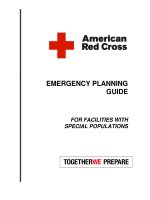
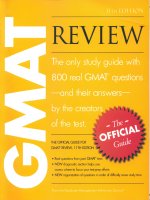
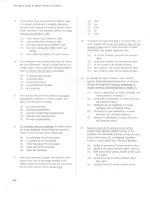
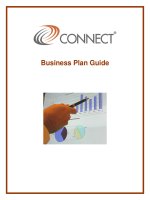


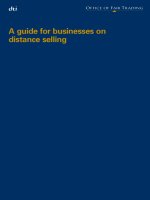

![the official chfi study guide for computer hacking forensics investigators [exam 312-49]](https://media.store123doc.com/images/document/14/rc/qf/medium_cUqcHSEon6.jpg)